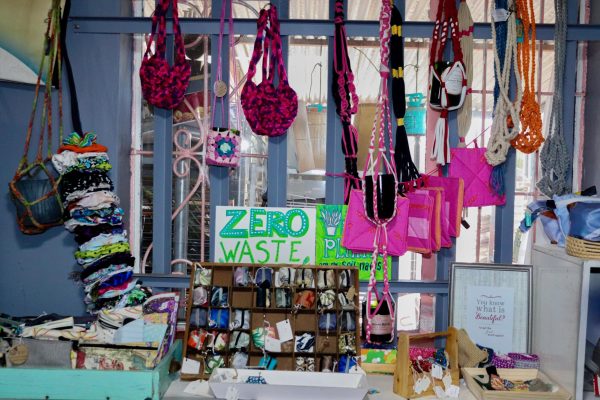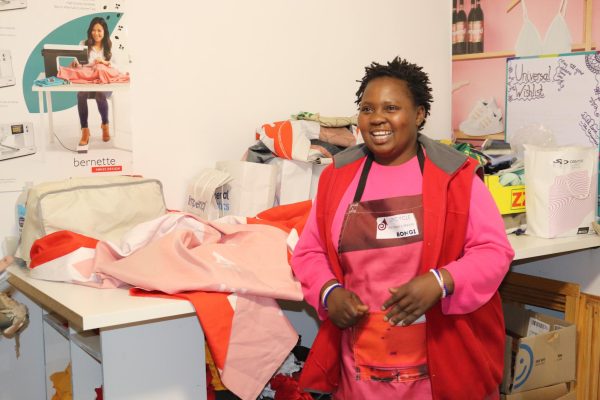
May Maoko, Upcycle's community trainer and store manager, stands outside the Johannesburg-based organization's store, which promotes sustainability through upcycled products. PHOTO: HELENA SIMS/THE HAWK
RANDBURG, South Africa – Amid a well-known stretch of antique shops that line Long Road is the storefront for a company called Upcycle that makes the old new again.
Upcycle creates and sells a wide selection of items handmade from non-recyclable waste.
While upcycling may sound similar to recycling, there is actually a difference between the two.
“Recycling is when you are going to turn your plastic into another [raw material],” said Gabi Theron, who helps run the shop and is in charge of quality control for the company. “Whereas upcycling, you are using something old and you’re making something new out of it.”
That bank billboard sign that once hung above a building and was headed for the trash? It’s now a double-lined, water-resistant shopping bag that currently retails for 80 rands ($4.50) at Upcycle.

Founded in 2006 by Winnie McHenry, Upcycle’s mission is to transform waste into usable items, from scrunchies made out of old clothes to drinking glasses crafted from Savanna Dry cider bottles to planters made from billboards.
McHenry said she was interested in “saving the planet” from an early age. After graduating with a certificate in interior design, she taught unemployed people how to make candles, mosaics and other handmade crafts. She also ran a website and business, Crafty Corner, that was focused on handmade crafts. But the cost of the material was often a deterrent for the people she wanted to help the most.
“In South Africa, I very quickly realized that people don’t have the money to put product or put money back into their business,” McHenry said.
So, McHenry turned to waste. That way, people wouldn’t have to spend money on resources, and any sales were pure profit. Upcycle was eventually created from that understanding.
“It wasn’t like I woke up one day and decided that’s what I want to do,” McHenry said. “It was a process of things, that problem solving, to make sure I could save the planet and help these people at the same time.”
Upycyle’s only physical location — there’s also a thriving online store — is in Randburg, a suburb of Johannesburg. For sale are items such as aprons, glass art, hats, lamp shades, hair accessories, planters and blankets, all upcycled from trash. The most popular items are laptop bags, messenger bags, diaries and drinking glasses, Theron said.
McHenry, who comes up with the product concepts, gets the ideas from walking around her house with an empty plastic bottle or some other piece of trash in hand, going room to room, and trying to imagine what that trash could become.
“In essence really, it’s all about playing,” McHenry said. “If you don’t play, you are never going to accidentally create something.”
McHenry also said she strives to make products that don’t look like waste and become something of value.
The purpose of Upcycle is not just focusing on selling but on “showcasing sustainability, strategic waste minimization, upcycling and secular economy,” said May Maoko, store manager and head of community training initiatives.
Maoko began working at Upcycle in 2016, bringing his passion for recycled glass and sustainability, sparked by growing up in the city of Pretoria, which did not have a formal waste collection service at the time.
When Maoko is not teaching in the community or working to attract local corporate sponsors and investment projects, his daily responsibilities include running the shop, with a primary focus on the handcrafted section.
In South Africa, ESG, or environment, social and governance, is a framework used by stakeholders, such as organizations and investors, to evaluate management and operations relating to environmental, social and governance factors. Since joining the team at Upcycle, Maoko has worked to be “the face of ESG” for the organization.
When Maoko first joined Upcycle, not much was happening, he said. That has changed in the last few years. Corporations like Nedbank and Going Green now work with Upcycle, sponsoring community-based projects and buying back products, he said.
“There has been a very huge, positive development,” Maoko said.

As part of Upcycle’s mission, people in the community contribute to making Upcycle products. Upcycle holds sewing classes for women in local townships. There are beginner classes for those who have never sewn before, as well as more advanced classes for those who have been taking classes for quite some time. People in these townships, as well as in rural areas, are also taught how to make products out of waste in their communities.
“They go there and train them to do things from waste to actually let them make money for themselves,” Theron said. She recalled people making pencil cases and wallet holders out of plastic, as well as mosaics out of glass.
As the person in charge of Upcycle’s quality control, Theron sometimes finds herself in the position of turning products down if they fail to meet the company’s standards. None of Upcycle’s products can retain branding or advertising from large companies, such as Nike or Puma.
Her responsibilities also include checking the size of the items and making sure everything is stitched, sewn and bound neatly and accurately before being sold. If something is wrong, she will explain to the sewers why and show them what to fix for the product to be eligible for sale.
“It takes time, and you’ve just got to be patient. Because they need to learn,” Theron said.
In addition to the retail space, the location is filled with material waiting to be made into something new. That part of the process happens next door at one of Upcycle’s two sewing centers.
Sewing manager Bongi Vilakazi has been working at Upcycle for almost 10 years now. As head of the sewing center, Vilakazi is responsible for mentoring and training her team while overseeing all day-to-day operations in the department. There are about 14 women working across the two sewing centers, Vilakazi said.
“It’s the outcome you get from something that you thought, like, ‘It’s waste,’ so now you have to bring it to life,” Vilakazi said.

For Vilakazi, one of her favorite parts about this work is witnessing the pride the women take in what they have created.
“Every time I find someone who doesn’t even know how to use a sewing machine, their faces when they start using the first product that they make, it’s that feeling. It’s awesome,” Vilakazi said.
Ultimately, Upcycle is not just about the items it sells in its shop and on its website, Maoko said, or even about addressing waste in the environment. It is about people, especially those who benefit the most from the company’s mission.
“I think each and every individual has the responsibility to [do] the little that they can do,” Maoko said.
For McHenry, too, it all comes down to people.
“The most important thing for me is to teach as many people as I can so that they can start making a difference in their environment,” McHenry said.